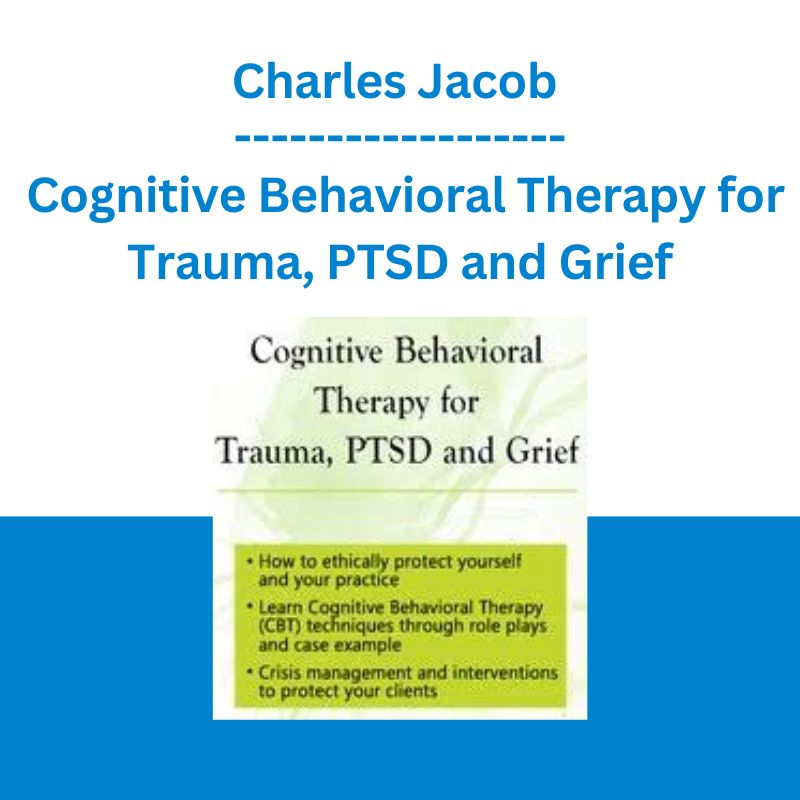*** Proof of Product ***
Exploring the Essential Features of “Charles Jacob – Cognitive Behavioral Therapy for Trauma, PTSD and Grief”
Description
- How to ethically protect yourself and your practice
- Learn Cognitive Behavioral Therapy (CBT) techniques through role plays and case example
- Crisis management and interventions to protect your clients
Trauma, grief and loss are regular aspects of your practice; and yet, you may not really be aware of what works and what doesn’t work in helping clients move forward with their lives. You might even be causing your clients (and yourself) more harm…
This seminar pulls from cutting edge research to help you identify effective Cognitive Behavioral Therapy (CBT)-focused interventions to help clients cope in the aftermath of trauma, PTSD, grief and loss. It has been shown that CBT techniques are a powerful tool for trauma and PTSD. You will have an opportunity to put these new skills to practice during role-playing exercises and case examples throughout the day.
When working with clients suffering from trauma, grief and loss, you need to be aware of the risk factors for you, your practice and your clients. This seminar will address ways to effectively deal with crisis management and summarize how to be sure your clients are safe and using best practices to avoid litigation.
Vicarious trauma of the therapist (you!) is another serious problem that comes along with these clients. Caring for the self is equally important for you to be the best therapist you can be. This seminar will teach you mindfulness skills to use as a protective tool, as well as CBT techniques to help heal vicarious trauma that may affect your practice and your personal life.
Speaker
Charles Jacob, PhD
Charles Jacob, PhD, received his PhD from the Pennsylvania State University and completed a year of additional training at the Center for Cognitive Therapy at the University of Pennsylvania. He has over 15 years of clinical experience conducting and overseeing the delivery of mental health services to individuals with severe mood and personality disorders as well as their families.
Dr. Jacob is an expert in cognitive therapy, as well as a highly regarded clinician and scholar. He has regularly delivered lectures on cognitive behavioral therapies throughout the country and has been an invited speaker at universities throughout the world. Dr. Jacob is an Evergreen Certifications approved CBT-C consultant. He is a past president of the ACA’s Pennsylvania branch, a recipient of PCA’s David W. Hall Advocacy Award, and has been a featured interview in Counseling Today as well as NPR’s The Pulse.
Speaker Disclosures:
Financial: Dr. Charles Jacob maintains a private practice and receives royalties as a published author. He receives a grant from the United States Bureau of Educational and Cultural Affairs. Dr. Jacob receives a speaking honorarium and recording royalties from PESI, Inc. He has no relevant financial relationships with ineligible organizations.
Non-financial: Dr. Charles Jacob has no relevant non-financial relationships.
Target Audience
Addiction Counselors, Case Managers, Marriage & Family Therapists, Nurses, Psychologists, Social Workers, and other Mental Health Professionals.
Objectives
- Explain how to use CBT for the treatment of PTSD and grief.
- Describe exposure-based treatment for trauma, clinical assessment and treatment issues to avoid.
- Explain how to use mindfulness and CBT in the prevention and management of vicarious trauma.
- Identify CBT techniques to use with crisis management and intervention.
- Identify the essentials of treatments that may cause harm to your clients, as well as alternate interventions supported by current research (CBT and otherwise).
- Discuss ways to keep you, your practice and your clients safe.
Outline
Healing Grief and Loss
- CBT as conceptual framework
- Timing and techniques for specific interventions
- When to use CBT
- When to use other techniques for grief
CBT Techniques for Trauma and PTSD
- Essentials of exposure-based treatment
- Exposure-based treatment to manage symptoms of PTSD
- Clinical assessment and CBT-based trauma treatment
- Structured assessment methods
- Less formal assessment methods
- CBT Treatment strategies for trauma and PTSD
- Critical Incident Stress Debriefing
- Specific techniques
- Interfering with the natural process of coping
- Prochaska’s model as a guide for intervention
- Recovered memory techniques and the treatment of dissociation
- Role playing exercises/Case examples
CBT for Managing Crisis and Crisis Intervention
- Essentials and risk factors
- CBT techniques to keep your clients safe
- Matching versus calming
- Breathing exercises
- CBT and safety planning
- Specifics of assessment and crisis planning
- Concerns and criticism regarding safety contracts
- Role playing exercises/Case examples
Keeping You and Your Practice Safe
- Ethically work with these difficult clients
- Documentation and lessening risks for litigation
- Best practices in the event of a lawsuit
- Manage personal anxiety in the aftermath of losing a client
- Being aware of your vicarious trauma
- CBT to conceptualize personal and professional impairment
- Difference of self-care and mindfulness
- Mindfulness-based interventions
Please see the full list of alternative group-buy courses available here: https://lunacourse.com/shop/










 Team NFT Money - Ultimate NFT Playbook
Team NFT Money - Ultimate NFT Playbook  Fred Haug - Virtual Wholesaling Simplified
Fred Haug - Virtual Wholesaling Simplified  Julie Stoian & Cathy Olson - Launch Gorgeous - Funnel Gorgeous Bundle
Julie Stoian & Cathy Olson - Launch Gorgeous - Funnel Gorgeous Bundle  Chris Capre - Advanced Price Action Ongoing Training & Webinars
Chris Capre - Advanced Price Action Ongoing Training & Webinars  Erik Banks - Alternative Risk Transfer
Erik Banks - Alternative Risk Transfer